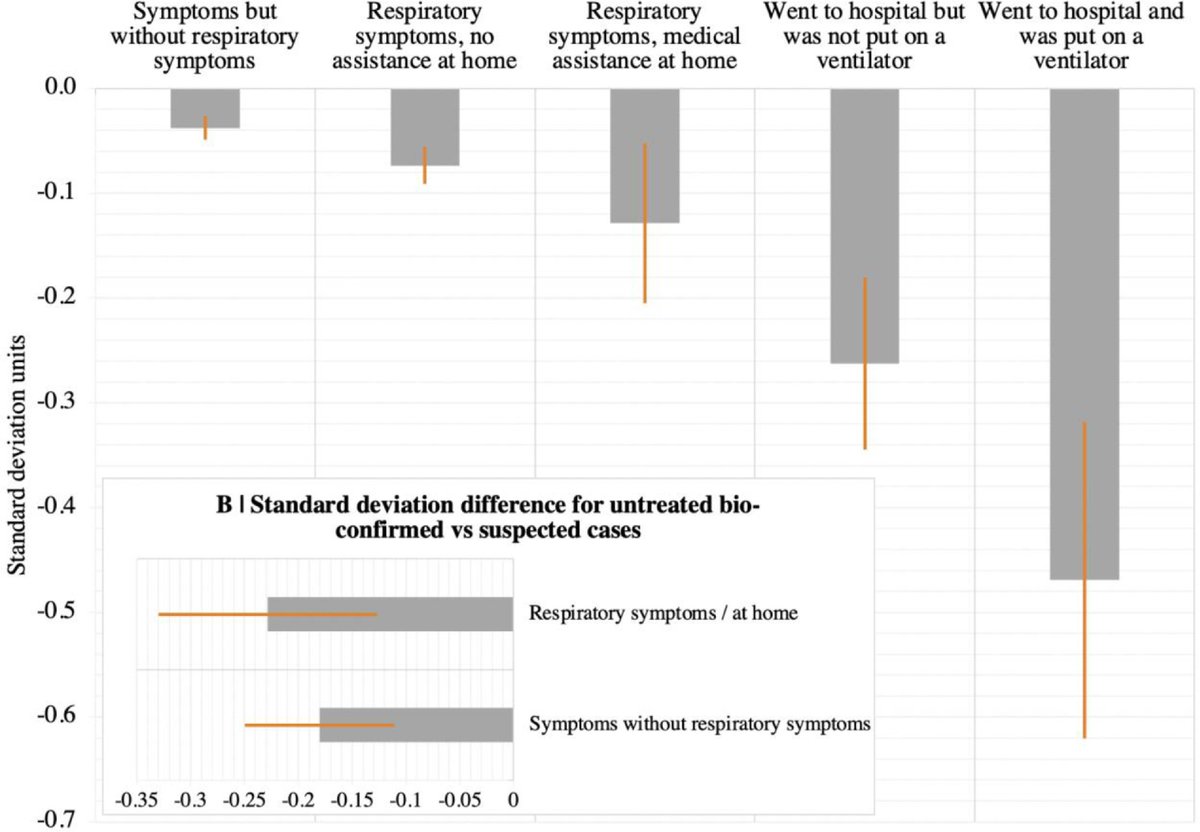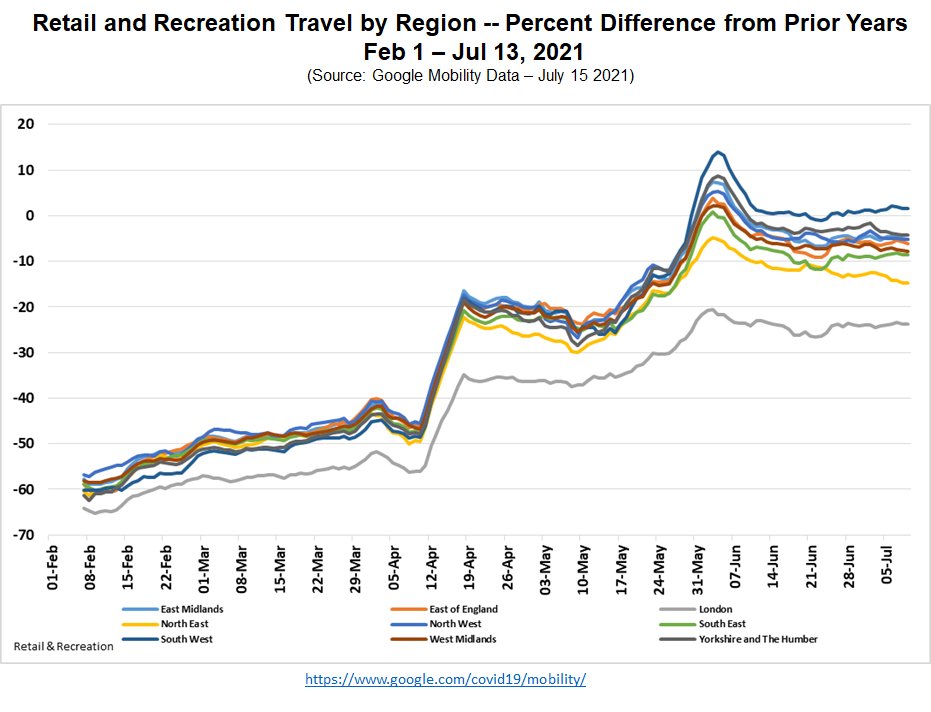
LONG THREAD: so I said yesterday I felt that the schools study in daily testing instead of isolation of pupils had been misreported. I don't think study tells you very much except that neither isolation or testing are working very well in schools.
Here is why...
Here is why...
What does study do? It takes 201 schools and assigns 99 to be "controls" - ie continue as normal, asking contacts of children with new confirmed covid to isolate for 10 days. The other 102 schools get assigned to "daily contact testing" (DCT) for contacts instead of isolation.
The hypothesis was that children in the DCT (testing) schools would miss fewer schools days than those in the control (isolation) schools without impacting 'too much' on transmission of covid.
So what was 'too much' transmission - well they said that anything up to 50% *more* transmission would be acceptable. That's a lot - similar to difference in transmission between Delta and Alpha variants.
I'd have preferred a lowe threshold but it would need more schools
I'd have preferred a lowe threshold but it would need more schools
The main outcomes of the study were:
1) did more kids in the DCT schools get covid than in control (isolation) schools?
2) did were fewer school days missed cos of covid in DCT schools compared to control ones?
1) did more kids in the DCT schools get covid than in control (isolation) schools?
2) did were fewer school days missed cos of covid in DCT schools compared to control ones?

They used "intention to treat" - so compared outcomes in all control schools to all DCT schools, regardless of how much daily contact testing actually happened.
This is normal and good practice in trials *but* it has big consequences for this study.
This is normal and good practice in trials *but* it has big consequences for this study.
After being assigned to be a control or DCT school, schools could pull out of the study. Only 76/99 and 86/102 schools actively participated. The 16 DCT schools who didn't actively participate *all* did isolation as normal.
In the DCT schools, identified contacts of a new student case could choose whether to do daily testing (DCT) *or* carry on as before (ie isolating at home), like kids in control schools. In fact, only 42% of contacts in DCT schools took up the daily testing. 

Additionally, DCT schools could also stop doing daily testing if advised to send year groups home, or close entirely.
And this happened at 14/102 DCT schools, 9 due to concern about Delta or high community transmission.
And this happened at 14/102 DCT schools, 9 due to concern about Delta or high community transmission.

So in fact - the majority of contacts in the *daily testing* (DCT) schools isolated, just like students in the control school.
So: some DCT schools didn't do it at all, some had pauses with lots of isolation and in schools that did test, most contacts chose to isolate.
So: some DCT schools didn't do it at all, some had pauses with lots of isolation and in schools that did test, most contacts chose to isolate.
In that respect, you wouldn't expect a big difference between the schools on either infection rate OR schools absence (primary outcomes).
And that's what we see - all of the confidence intervals (2nd column) include 1 meaning can't rule out no difference.
And that's what we see - all of the confidence intervals (2nd column) include 1 meaning can't rule out no difference.

The right hand columns tried to tease out the impact for only those doing the daily testing. Hard to do though cos of complexity of lots of things happening at different levels (kids, schools, community).
That also shows no evidence of difference in either outcome. BUT
That also shows no evidence of difference in either outcome. BUT
the confidence interval for new cases is really wide from 45% reduced to 34% higher. 34% higher would be a lot extra I think. 45% lower would be massive.
Other complicating factor - most cases (and so contacts) were in June, once Delta dominant, but that was also when lots of isolation in the DCT schools!
And we know schools more impacted when community cases high. And in July (after trial), rates more than doubled vs June.
And we know schools more impacted when community cases high. And in July (after trial), rates more than doubled vs June.

What does this mean for next term? Well - firstly, if isolation stopped as per govt plans, presumably schools and students have no (or less?) choice to isolate instead of daily testing. And are case rates going to more like July than May??
Secondly, this study is just secondary schools. What about primary schools? are they going to keep isolating? (arguably more disruptive to parents) or do daily testing (which hasn't been tried and more challenging in young kids)? Or nothing?
So basically, given that much of the "daily testing" arm was actually isolation as for control arm and that we ended up with very wide confidence intervals, and presumably next term there won't be a choice of isolation or testing - I don't think this tells us anything that useful
But oh my god it was spun in the media.
Susan Hopkins, head of PHE, called it a "breakthrough". It isn't.
The lack of evidence for more attendance was spun to "will work" while lack of evidence for more infection became "it's safe".

Susan Hopkins, head of PHE, called it a "breakthrough". It isn't.
The lack of evidence for more attendance was spun to "will work" while lack of evidence for more infection became "it's safe".


Of course if in September *no contacts isolate*, attendance will go up. Whether it won't also increase transmission by quite a bit (eg 30% or more), this study doesn't tell you.
This Daily Mail headline is just plain wrong and they cherry pick the extreme possibilities of a study that actually rules out or proves very little.
Metro does similar.
No one mentions that there was masses of isolation in the DCT schools.

Metro does similar.
No one mentions that there was masses of isolation in the DCT schools.


Almost all articles quote the secondary outcome that about 1.5% (<1 in 50) of contacts tested positive regardless of whether it was isolation or "testing" school.
Not sure we'd expect any difference between school since contacts already considered exposed to covid before either isolating or testing.
Instead, this implies to me that contact identification in schools and/or case ascertainment is pretty rubbish.
Instead, this implies to me that contact identification in schools and/or case ascertainment is pretty rubbish.
PHE says that about 6.6% of non household contacts of Delta cases get Covid.
We know cases in older kids in June much higher than their parents. It's frankly implausible that somehow schools, full of unvaxxed kids in classrooms all day, only had 1.5% onward infection.

We know cases in older kids in June much higher than their parents. It's frankly implausible that somehow schools, full of unvaxxed kids in classrooms all day, only had 1.5% onward infection.


Conclusion 1: neither current isolation procedure or daily testing is particularly effective at keeping schools safe in context of v high community transmission and no mitigations in school or out.
Conclusion 2: given govt not vaxxing kids & ok with them getting infected, why are they even bothering with this study? Removing isolation for all will increase attendance. Making no effort to get cases low or protecting schools will also lead to high infections at schools. /END
Preprint of study is here:
modmedmicro.nsms.ox.ac.uk/wp-content/upl…
Also other issues about how good the rapid tests here covered by @deeksj
@dgurdasani1 has other concerns again
modmedmicro.nsms.ox.ac.uk/wp-content/upl…
Also other issues about how good the rapid tests here covered by @deeksj
https://twitter.com/deeksj/status/1418474925090803714?s=20
@dgurdasani1 has other concerns again
https://twitter.com/dgurdasani1/status/1418531436286693384?s=20
• • •
Missing some Tweet in this thread? You can try to
force a refresh
















